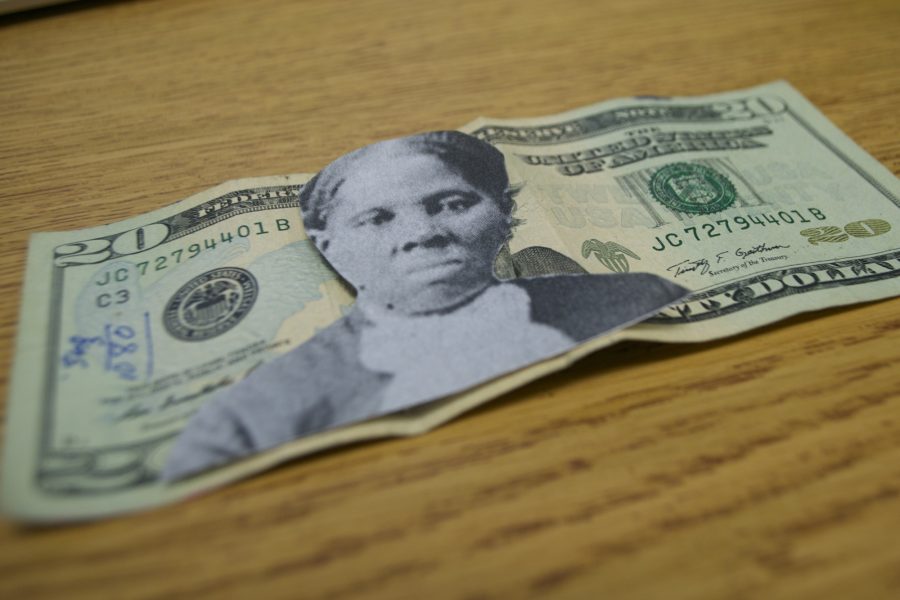NC reacts: Tubman to replace Jackson on $20 bill
An emblem to all supporters of the civil rights movement and women’s rights groups, Harriet Tubman now resides on the $20 bill.
April 26, 2016
After much debate, Treasury Secretary Jacob Dew announced the replacement of Andrew Jackson on the $20 bill on April 20. The new bill will showcase the face of Harriet Tubman.
Tubman represents a lead figure in American history, an Abolitionist who aided slaves escaping the South. The decision to replace Jackson reflects the contribution women have in society and the importance of their actions.
Junior Kenya Vargas upon hearing the news said, “Adding a woman to a bill adds a diversity and disperses the gender roles more than the stereotypes that you see everyday.”
The ruling marked a historical time in history, where a woman will become the face on U.S currency since 1896. Martha Washington served as the last woman featured.
“With this decision, our currency will now tell more of our story and reflect the contributions women as well as men to our great democracy,” Dew said.
While the idea surfaced last summer, the treasury recently announced the change of the currency, the release date set for 2030. Women’s rights groups feel the wait as too much of a delay.
Women on 20s, an activist group, stated on April 17 on their website, “Fifteen years is not soon in anybody’s book. And the backs of two bills in the meantime will amount to an insult.”
On the other hand, Andrew Jackson supporters as well as historians and economists feel the expense of Jackson too great. They respond that Jackson played a major role in the vicious crusade against Native Americans.
Other changes include the reinvention of the back of the $10 bill, where it will showcase the suffrage movement. While the $5 bill will include leaders of the civil rights movement.
While Harriet Tubman will become the fresh face of the $20 bill, Jackson will still reside on the back of the dollar where he will be depicted with the White House. This offers a compromise for both supporters and critics.








Jacob Tutterow • Apr 27, 2016 at 3:03 PM
In my mind I believe Andrew Jackson has a much bigger place on the $20 bill, much more than Harriet Tubman. Andrew Jackson was one of the greatest american presidents and did lots to improve the country and brought more innovation to the US, while Harriet Tubman only led around 200 slaves to freedom. That is a great achievement, but her accomplishments are dwarfed by Andrew Jackson
Judy Stubblefield • Sep 14, 2016 at 2:18 AM
WOW. Wowowowowowowoowoowwow. WOW. How can paving a way to freedom for (300+ [by the way]) people that were kidnapped like animals, forced to work like animals, and oppressed to live like animals be dwarfed by anything? She is an integral role in the American story and has never been recognized on this grand of scale until now. When has an African-American ever been (nationally/federally) and timelessly memorialized? Why can’t we have that?
Also, you are very vague in describing why Andrew Jackson “was one of the greatest American presidents” and explaining “the lots he did of our country.” Do you even know anything about his presidency? Do you know?? What are his accomplishments? The genocide of American natives? NOT ending slavery? Participating in it? Perpetuating White Supremacy? Enlighten me.
Jacob Tutterow • Sep 15, 2016 at 8:35 PM
I understand that Harriet Tubman did do a noble and heroic thing for american slaves, but I still stand by my point. The achievements of somebody can be dwarfed by anybody else, such as Harriet Tubman’s 200-300 slaves being rescued by somebody else possibly ending a war, or helping more people.
As for nationally/federally recognized African Americans, explain to me why there are over 900 streets in America named Martin Luther King Jr.? The American government has made a huge effort to have black people in our history and recognize them, and the replacement of one of the greatest presidents on our currency is unnecessary and kind of insulting to the legacy of Andrew Jackson.
Andrew Jackson is one of the greatest presidents because he made huge efforts to destroy corruption in the American political system, and fight against tyrannical banks attempting to undermine what American was at the time. It is true that he sympathized with southerners more on slavery, but he also wanted the country to be together and not bicker over it. He did anything he could to get the slavery issue speedily dealt with. The only bad thing he did, wasn’t even in his presidency, it was carried out by his successor, Martin Van Buren. The Indian Removal Act was actually one of the most human ways the American people wanted to deal with the Indians, because they were so different from them and there was hardly any way they could integrate into society. Yes, it was a tragedy and many people died, but more would have died if it weren’t him in office, and considering the impending Civil War brewing in America in the 1830s, he did a good job. No, he didn’t perpetuate white supremacy at all, and, just saying, if you were a rich white man back in the 1830s, you wouldn’t feel much different than he did. It was just what society was back then, and there wasn’t much you could do about it.
Andrew Jackson was the first president that was almost murdered, on several occasions, because he challenged the corruption happening in the political system at the time. In retrospect, he was a great president for fighting for the American people as much as he could, and while the Indian Removal Act was a really awful thing that happened, there really wasn’t another option. Native Americans were hostile to the settlers, but we could have slaughtered all of them, but we gave them land away from the constant fighting and conflict. So no, he isn’t a terrible person, white supremacist, genocide overseer, or anything other than a great president.